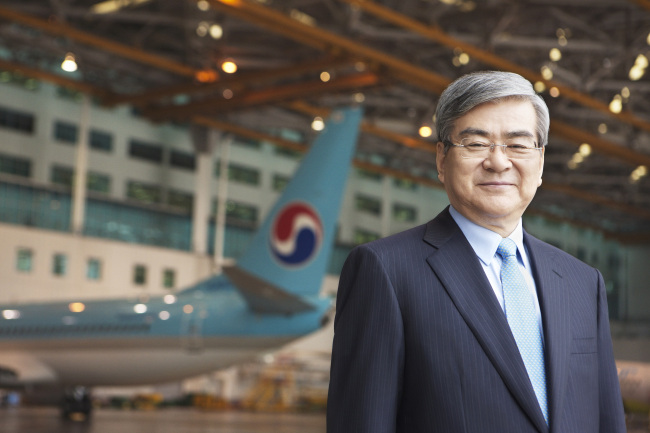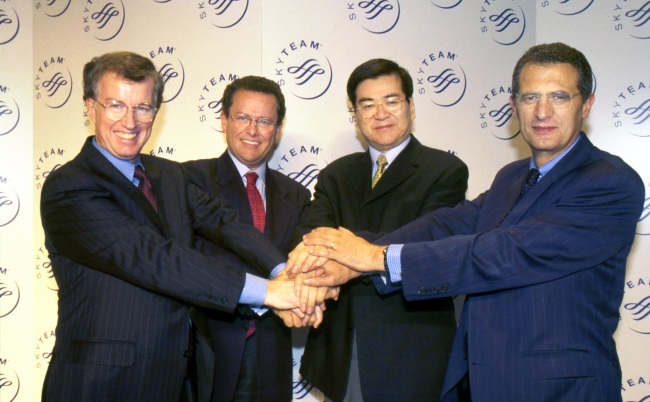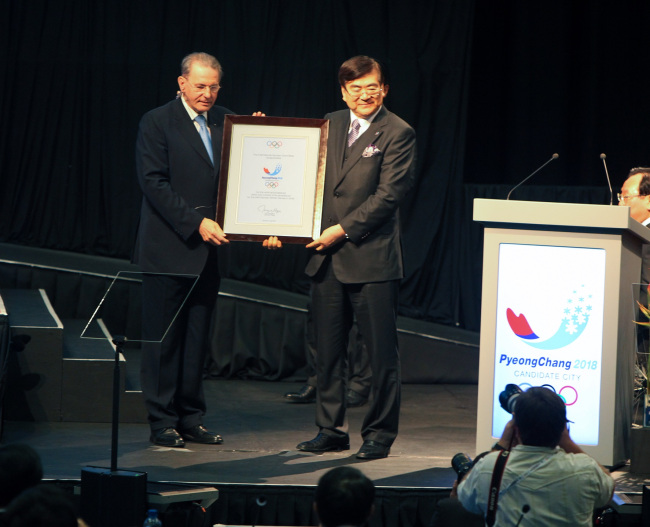Cho Yang-ho, the second-generation chaebol scion who led the rise of the nation’s largest air carrier Korean Air, only to struggle late in life to contain damage from a series of power abuse scandals involving his wife and children, died Monday in Los Angeles. He was 70.
He had been receiving treatment for pulmonary fibrosis, a chronic disease, since late last year that was not disclosed to the public. He died at a hospital in LA early Monday morning Korean time, in the presence of his family members, the company said.
The death of the chairman of Hanjin KAL, parent company of Korean Air, instantly sent shock waves through business circles, coming just 10 days after he was stripped of management rights of the air carrier after a campaign led by the National Pension Service to hold him responsible for infringing on investors’ rights.
 |
Late Chairman Cho Yang-ho stands in front of Korean Air's cargo for photo. (Korean Air) |
Born in 1949 as the eldest son of Hanjin Group founder Cho Jung-hun, Cho Yang-ho joined Korean Air at the age of 25 and climbed the corporate ladder by serving in various roles within the air carrier. Eighteen years later, in 1992, he ascended to the CEO post of Korean Air and became a vice chairman of Hanjin Group, the transport empire his father had built from shipping to airline businesses. He took over for his father in the chairman post in 2003, a year after his death.
As a businessman, Cho was a rare expert with a 45-year career in the aviation industry and as a leader who brought both the reputation and service quality of Korean Air to the top tier. He endured the dark times of the domestic economy as it suffered from severe liquidity crises in 1997 and 2008, seeing through Korean Air’s operations by making tough management decisions such as selling planes and maintaining services through lease programs, according to Korean Air officials.
The US-educated tycoon led the launch of an alliance of global air carriers, known as Sky Team, and served key roles in the International Air Transport Association, an international organization for the safety and standards of air carriers and their operations. In 2008, Cho launched Jin Air, the budget airline segment of Korean Air, opening a new era for diversified airline businesses.
 |
(Korean Air) |
Cho was also a dedicated patron of Korean sports. He served as the organizing committee chair of the 2018 PyeongChang Olympics and promoted the event globally until he bitterly stepped down under governmental pressure in 2016. He was also the chairman of the Korean Association of Table Tennis.
In comparison to Korean Air’s rise as a global air carrier, Cho suffered from constant family feuds over his father’s inheritance and public criticism concerning a series of misconduct by his family members that not only tainted his legacy, but also the public reputation of Hanjin Group.
Since his father’s death in 2002, Cho and his three brothers undertook six years of harsh legal battles, with his brothers questioning the legitimacy of the father’s will, claiming it was manipulated in favor of the eldest brother. While Cho inherited Hanjin Group along with the group’s cash cow Korean Air, his younger brothers, Nam-ho and Soo-ho, took chairman posts of Hanjin Heavy Industries and Hanjin Shipping, both of which later went bankrupt.
 |
(Korean Air) |
As the patriarch of his own troubled family, Cho had been under heavy public pressure over the misdeeds of his daughters and wife.
The 2014 case of the Korean Air heiress assaulting a cabin member and ordering her airplane to return to the gate at a New York airport because she did not like the way a pack of macadamia nuts had been served in first class was the beginning of the family’s fall.
In a rare announcement, Cho, as the father, apologized for causing public concern and removed his eldest daughter, Cho Hyun-ah, from her executive post at Korean Air to soothe public anger.
However, Korean Air was thrown back into crisis again last year when Cho Hyun-min, the chairman’s youngest daughter, was accused of throwing a cup of water at an advertising agency manager for not being able to answer a question. Cho’s 70-year-old wife Lee Myung-hee has also been accused of multiple assault and abuse allegations.
Cho himself was also facing trial on charges of embezzlement, tax evasion and breach of trust. The local court dismissed the case Monday, citing his death.
The biggest and final blow for Cho was a shareholders’ vote last month that kicked him out of the boardroom of Korean Air and dragged him down from the top post he had held for 20 years.
On March 26, Korean Air shareholders voted against the airline’s proposal to extend Cho’s term as a board director for three years, with 64.1 percent in favor and 35.9 percent against during the regular shareholders meeting. Cho needed a two-thirds majority to retain control.
Cho was the first conglomerate chief ousted since the nation’s pension fund decided to actively exercise voting rights last year for responsible investing. The case was widely seen as the ultimate consequence for the Cho family that had shamelessly become the icon of “gabjil,” referring to those of higher business status abusing power over those of inferior status.
The vote result probably was “a realization of justice” for the public. But it only made his condition worse, causing extreme stress and shock, according to Korean Air officials.
The air carrier, in a lengthy statement, said the chairman returned to the sky he loved, adored and dedicated his whole life to, and that he will forever breathe with Korean Air, calling the firm the legacy he has built.
By Cho Chung-un (
christory@heraldcorp.com)









![[Today’s K-pop] Blackpink’s Jennie, Lisa invited to Coachella as solo acts](http://res.heraldm.com/phpwas/restmb_idxmake.php?idx=644&simg=/content/image/2024/11/21/20241121050099_0.jpg)
